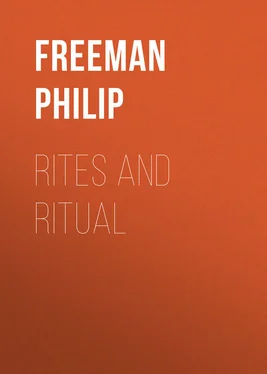Philip Freeman - Rites and Ritual
Здесь есть возможность читать онлайн «Philip Freeman - Rites and Ritual» — ознакомительный отрывок электронной книги совершенно бесплатно, а после прочтения отрывка купить полную версию. В некоторых случаях можно слушать аудио, скачать через торрент в формате fb2 и присутствует краткое содержание. Жанр: foreign_antique, foreign_prose, на английском языке. Описание произведения, (предисловие) а так же отзывы посетителей доступны на портале библиотеки ЛибКат.
- Название:Rites and Ritual
- Автор:
- Жанр:
- Год:неизвестен
- ISBN:нет данных
- Рейтинг книги:4 / 5. Голосов: 1
-
Избранное:Добавить в избранное
- Отзывы:
-
Ваша оценка:
- 80
- 1
- 2
- 3
- 4
- 5
Rites and Ritual: краткое содержание, описание и аннотация
Предлагаем к чтению аннотацию, описание, краткое содержание или предисловие (зависит от того, что написал сам автор книги «Rites and Ritual»). Если вы не нашли необходимую информацию о книге — напишите в комментариях, мы постараемся отыскать её.
Rites and Ritual — читать онлайн ознакомительный отрывок
Ниже представлен текст книги, разбитый по страницам. Система сохранения места последней прочитанной страницы, позволяет с удобством читать онлайн бесплатно книгу «Rites and Ritual», без необходимости каждый раз заново искать на чём Вы остановились. Поставьте закладку, и сможете в любой момент перейти на страницу, на которой закончили чтение.
Интервал:
Закладка:
I have preferred, in what has been said, to place this duty on the lofty ground of zeal for the integrity of the great Mystery of our religion, and of reverence for the commands of Christ, and the practice of His Apostles, rather than on the lower ones of expediency and advantage. And in this light I would earnestly desire that it may be primarily regarded. The only question for any branch of God's Church ought to be, What is commanded? What did God Almighty intend, and types foreshadow, and Christ enjoin, and the Apostles practise? Whatever that was, it must be right for us to aim at, and to strive for it with all our hearts.
Yet I would not have it supposed but that there is every reason to hope for the largest measures of blessing, and of spiritual results, from a return to this practice. I will mention one very great scandal, the very canker and weakness of our whole parochial system, which has a fair likelihood of being removed by this means. Next to the infrequency of our Communions, the fewness of our communicants, – that is, in fact, of our bonâ fide members of the Church, – is our greatest and most inveterate evil. When this fewness is allowed its due significance, we must see and confess that the nominally Christian condition of this country is but an illusion and an untruth after all. Judged by our own Church's rule (which is the rule of Christ Himself), our communicants , and they only, are our people. The rest may call themselves what they will; or we may for euphony call them "our flocks," or God's people. But one thing is certain, that in those apostolic or early days to which we ever appeal, and rightly, as our standard, they would have been held to be reprobates, and no faithful members of Christ's body at all. Such then is our condition: – a miserable handful, even among those who are nominally members of the Church, having any claim to the title in reality. Now, how are these wanderers to be brought back? these abortive or moribund Christians to be induced to accept the gift of life, through the indispensable Sacrament? Surely, for the most part, even in the same way as converts are brought in, one by one, in heathen lands. Public ministrations, sermons, services, will not do it. It is a personal effort, a personal rendering up of self, that is needed; and it is only by seizing and pressing, in private intercourse, the chance occasions of speech, the day of sorrow, or of conviction of sin, that we can induce men to make this effort. But, unhappily, when they are prepared to make it, in the vast majority of our parishes, the "Communion Sunday" is too often a far-off event: and before it arrives the favourable impression and disposition has passed away. While, on the other hand, the ever-ready rite secures the communicant. In saying this, I am not merely theorizing, but describing what I have found to take place within my own experience. It has been found that in this way nearly one-third of the entire population of a parish may be brought in a few years to Holy Communion. Surely some may be induced to try the effect, were it with this view only, of the restoration of Weekly Celebration.
I am well aware, indeed, of the difficulties which, in many cases, stand in the way of such a restoration, and on these I would venture to say a few words.
In the first place, then, the state of things which prevails among us, and of which I have above ventured to speak in such strong language of deprecation, is one which we of this generation have not made, but inherited. It is not we, God be thanked, that have diminished, but rather, in almost all cases, increased, the frequency of our celebrations. The guilt of this evil custom is shared by the whole Church of fifteen hundred years past; and therefore we must not be surprised if very great difficulties are found in correcting it. The history of the desuetude, which we behold and deplore, is simply this. For nearly three centuries, scarcely any breach was made in the Church's Eucharistic practice. Not only was there universal weekly celebration, but universal weekly reception also; with only such abatement, doubtless, as either discipline or unavoidable hindrance entailed. But the ninth of the so-called Apostolic canons, belonging probably to the third century, speaks of some "who came in to hear the Scriptures, but did not remain for the prayer ( i. e. the Communion service) and holy reception." All such were to be suspended from Communion, as "bringing disorder into the Church," i. e. apparently (with reference to 2 Thess. iii. 6), as "walking disorderly, and not after the tradition received from the Apostles." By about A.D. 305, the Council of Elvira, as cited above, orders suspension after absence from the Church three successive Sundays: a curious indication of "monthly Communions" having been an early, as it continues to this day a favourite, form of declension from primitive practice. But by St. Chrysostom's time (c. 400) so rapidly had the evil increased, that he speaks of some who received but twice a year; and even of there being on occasion none at all to communicate. But this seems to have been but local, since we find the Council of Antioch, A.D. 341, reiterating the Apostolic canon: and even three centuries later, the old rule of suspension for three absences was still in force in the East; as Theodore of Tarsus, Archbishop of Canterbury in 668, testifies of the Greek Church, from which he came. But even in the East the decline was rapid. The Apostolical usage, confirmed by the ninth canon, was admitted to be binding; but obedience to it was given up as hopeless. Nay, even the laxer rule of Elvira was stretched by Canonists, 7 7 So Balsamon, in the twelfth century: "Though some desire by means of this Canon to oblige those who come to Church to receive the Sacraments against their will, yet we do not; for we decide that the faithful are to stay to the end of the Divine Sacrifice; but we do not force them to communicate." – See Scudamore, 'Communion of the Faithful,' p. 58. Yet later writers acknowledged the true meaning of the Canon, though they thus condemned the existing practice of the Church. – Ibid.
so as to recognise attendance without reception as sufficient. In the West the habit was all along laxer still than in the East. At Rome, as Theodore tells us, no penalty was inflicted for failing to communicate for three Sundays; but the more devout still received every Sunday and Saint's-day in the time of St. Bede; whereas in England, as St. Bede tells us, even the more religious laity did not presume to communicate – so utterly had the Apostolic idea of Communion perished – except at Christmas, Epiphany, and Easter. Some attempt was made in Spain and France 8 8 Council of Lugo, A.D. 572; of Maçon, A.D. 585.
in the sixth century to revive the pure Apostolic rule. But meanwhile the Council of Agde, held in 506, discloses the actual state of things by prescribing, as the condition of Church membership, three receptions in the year – at Christmas, Easter, and Pentecost. 9 9 "Sæculares qui natale Domini, pascha et pentecosten non communicaverint, catholici non credantur nec inter catholicos habeantur." – Concil. Agath., c. 18.
The recognition of this miserable pittance of grace, as sufficient for membership in Christ, was rapidly propagated through East and West; and remains, unhappily, as the litera scripta of two out of the three great branches of the Church – the Eastern and the English – to this day. In the Roman Church, ever since the Fourth Lateran Council in 1214, but one reception a year is enjoined under penalty; viz. at Easter. The English Church, however, never accepted the Lateran decree; but by Canons of Salisbury (about 1270), and of Lambeth (1378), re-affirmed the thrice-a-year rule. By the time of the Reformation, however, as is evident from the rubric attached to the Communion Office in Edward VI.'s First Book, reception once a year had become the recognised minimum in this country also. Meanwhile the miserable practice grew up, as a result of the lack of communicants, of the priest celebrating a so-called "Communion," on occasion at least, alone. It is probable that in the earlier days, as e. g. of St. Chrysostom, there were always clergy to receive; the "parochial" system of that time being to congregate several clergy at one cure. But in the ninth century, solitary celebrations existed extensively, and were forbidden, 10 10 Council of Paris (829).
in the West. Not, however, to much purpose. It soon became the rule, rather than the exception, for the priest to celebrate alone; and thus it continued until the Reformation. The Council of Trent contented itself with feebly wishing things were otherwise; and justified the abuse on the ground of vicarious celebration and spiritual communion.
Интервал:
Закладка:
Похожие книги на «Rites and Ritual»
Представляем Вашему вниманию похожие книги на «Rites and Ritual» списком для выбора. Мы отобрали схожую по названию и смыслу литературу в надежде предоставить читателям больше вариантов отыскать новые, интересные, ещё непрочитанные произведения.
Обсуждение, отзывы о книге «Rites and Ritual» и просто собственные мнения читателей. Оставьте ваши комментарии, напишите, что Вы думаете о произведении, его смысле или главных героях. Укажите что конкретно понравилось, а что нет, и почему Вы так считаете.












